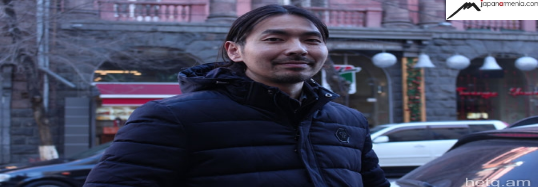
A Japanese Lecturer: “The Auditoriums in the Armenian HEIs are not Adapted to Students”
11:16, January 17, 2018
“They should call me “Taiji sensei” or “Taiji san”, but it would be better to call me just by name”, says Japanese Taiji Notsu, who has come to Armenia 5 months ago. He teaches Japanese at Yerevan State University (Faculty of International Relations) and Russian-Armenian (Slavonic) University.International Japanese Speech Contest, which took place in 2017 in Georgia gave him an opportunity to discover a new culture. He says that because of the complexity of the language students often don’t complete the lessons: “I have one year contract with the two universities. It seems that in Slavonic University they are more enthusiastic to learn Japanese. The girls are hard working, but the boys aren’t. I think that this is also because of the military system, military service: they are lazy”.
In his opinion, the structure of the examination system in the Armenian HEIs is complicated. He compares with the high school and complains that the students are overloaded with vocational subjects: “For example, in Japan students have only one exam during each semester. It seems that in Armenia everything proceeds according to the plan. I think that the subjects chosen by the students should be a motivation for them”.
“If you don’t want to attend a course don’t do that: you are already an adult and you can make decisions”
Taiji is led by this mentality when working with the students. He mentions that in the universities the majority has difficulties in speaking English; that is why it is not easy to communicate. “Many lecturers can easily talk to me. But I can’t say anything about their lessons because the working language is Armenian and I am not attending the lessons”.
According to the Japanese, there is a serious problem of technical saturation in the HEIs: the auditoriums aren’t adapted to the students. Comparing with his country he mentions that there the universities are equipped with the corresponding technique.
“In Armenia the sky is surprisingly always blue”
When walking in the streets Taiji often catches looks, which carefully “examine” him. He doesn’t complain of living alone in Yerevan: he is already used to it. He has managed to get used to the local culture: he has learned colloquial words and even dances. “I like the water here very much. For me mountain water is the best in the world. And I know several Armenian dances: the most famous is (he thinks over and remembers the name) Kochari. The words that I have learned are “barev dzez” (hello), “vonts es?” (how are you?), “tsetesutyun” (see you), “artakarg” (excellent, perfect), “hajox” (good-bye)”.
Taiji says that when looking at Ararat he misses Japan (he remembers Mount Fujiyama). He also resembles the Armenian and Japanese societies because they are both mono-ethnic: “I got tired of the Japanese society. People are always busy there. But in terms of similarities I can say that it is safe in both countries”.
Taiji’s contract will expire in June but he still doesn’t know whether to continue to work in Armenia or no.
Nelly Petrosyan
YSU Faculty of Journalism, 3rd year
the material is taken from goo.gl/1U3U2x
translated from Armenian into English by M.Vardanyan









